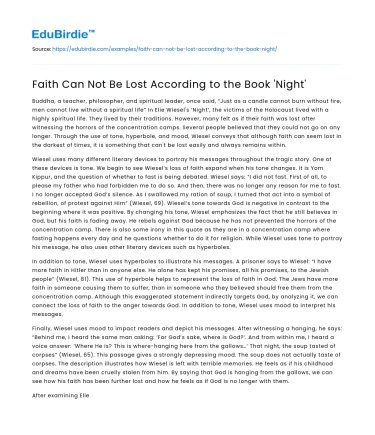Buddha, a teacher, philosopher, and spiritual leader, once said, “Just as a candle cannot burn without fire, men cannot live without a spiritual life” In Elie Wiesel's ‘Night’, the victims of the Holocaust lived with a highly spiritual life. They lived by their traditions. However, many felt as if their faith was lost after witnessing the horrors of the concentration camps. Several people believed that they could not go on any longer. Through the use of tone, hyperbole, and mood, Wiesel conveys that although faith can seem lost in the darkest of times, it is something that can't be lost easily and always remains within.
Wiesel uses many different literary devices to portray his messages throughout the tragic story. One of these devices is tone. We begin to see Wiesel’s loss of faith expand when his tone changes. It is Yom Kippur, and the question of whether to fast is being debated. Wiesel says: “I did not fast. First of all, to please my father who had forbidden me to do so. And then, there was no longer any reason for me to fast. I no longer accepted God’s silence. As I swallowed my ration of soup, I turned that act into a symbol of rebellion, of protest against Him” (Wiesel, 69). Wiesel’s tone towards God is negative in contrast to the beginning where it was positive. By changing his tone, Wiesel emphasizes the fact that he still believes in God, but his faith is fading away. He rebels against God because he has not prevented the horrors of the concentration camp. There is also some irony in this quote as they are in a concentration camp where fasting happens every day and he questions whether to do it for religion. While Wiesel uses tone to portray his message, he also uses other literary devices such as hyperboles.
Save your time!
We can take care of your essay
- Proper editing and formatting
- Free revision, title page, and bibliography
- Flexible prices and money-back guarantee
In addition to tone, Wiesel uses hyperboles to illustrate his messages. A prisoner says to Wiesel: “I have more faith in Hitler than in anyone else. He alone has kept his promises, all his promises, to the Jewish people” (Wiesel, 81). This use of hyperbole helps to represent the loss of faith in God. The Jews have more faith in someone causing them to suffer, than in someone who they believed should free them from the concentration camp. Although this exaggerated statement indirectly targets God, by analyzing it, we can connect the loss of faith to the anger towards God. In addition to tone, Wiesel uses mood to interpret his messages.
Finally, Wiesel uses mood to impact readers and depict his messages. After witnessing a hanging, he says: “Behind me, I heard the same man asking: ‘For God’s sake, where is God?’. And from within me, I heard a voice answer: ‘Where He is? This is where-hanging here from the gallows…’ That night, the soup tasted of corpses” (Wiesel, 65). This passage gives a strongly depressing mood. The soup does not actually taste of corpses. The description illustrates how Wiesel is left with terrible memories. He feels as if his childhood and dreams have been cruelly stolen from him. By saying that God is hanging from the gallows, we can see how his faith has been further lost and how he feels as if God is no longer with them.
After examining Elie Wiesel’s ‘Night’, we see how through the use of hyperboles, tone, and mood, Wiesel was able to convey that although faith can seem lost in the darkest of times, it is something that cannot be lost easily and always remains within. Wiesel experienced many horrors in the concentration camp and often felt as if his faith had gone completely. However, we see him acknowledge God many times throughout the story. Whether it was protesting against him by not fasting, having more faith in the person responsible for his pain than God, or witnessing dreadful events and questioning whether God was really with them, although he was losing his faith, he still acknowledged him. Although Wiesel is freed physically, he still feels trapped mentally. Studying the story is important because we can recognize the horrors of the past and how Wiesel emphasizes that it should not be repeated again.






 Stuck on your essay?
Stuck on your essay?

